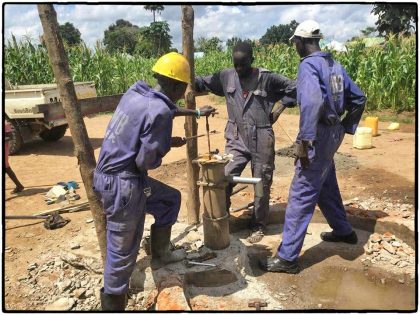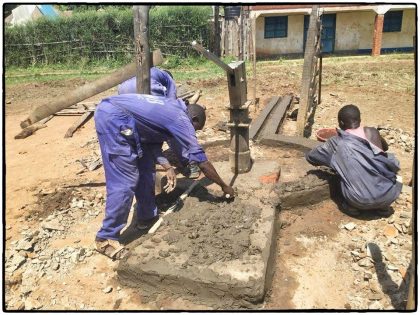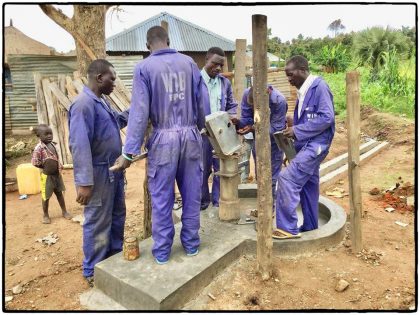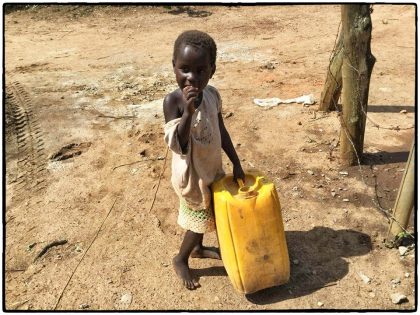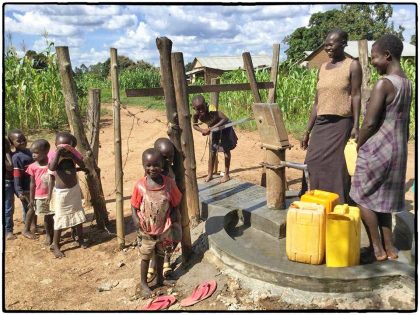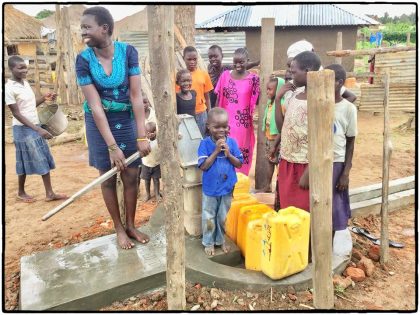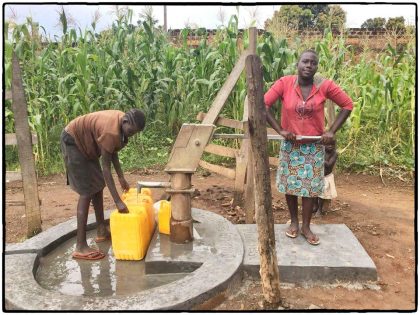Water Charity’s South Sudan Well Rehab Program – Phase V
To restore 16 relief wells in Yei River State
Introduction
As part of our extensive South Sudan Well Rehab Program, Phase Five expand upon the already extensive work we have done in that nation. Water Charity has partnered with Water is Basic during a fragile time in South Sudan’s young existence. To date, Water Charity has worked with the local South Sudanese team to do crucial work in the midst of a five-year civil war. So far, we have fixed many dozens of wells and distributed many filters, impacting what we had thought was an estimated 75,000 desperate South Sudanese. This number is proving to be much higher as the villages in question often swell in population once they have a stable source of clean water! It is not uncommon for villages to quadruple in size as refugees returning to South Sudan make their homes in these now-livable villages.
Our ability to stay in the game during this crisis period gave our local partners unprecedented influence in negotiating grassroots peace. On September 12th, warring parties came together signing a peace deal to end the war, and our hopes are high as people are returning home.
South Sudan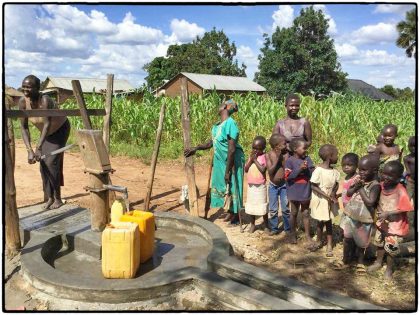
An estimated 383,000 have died as a result of South Sudan’s 5-year civil war. It has been reported that half were killed in fighting between ethnic rivals, and the other half from disease including waterborne llness, hunger and other causes exacerbated by conflict. The death toll was the highest in 2016 and 2017 after a power-sharing agreement brokered in 2015 fell apart.
Because of violence, large portions of South Sudan have been inaccessible for periods of time. Aid workers have been targeted during the conflict. The Aid Worker Security Report determined that last year, for the third year in a row, South Sudan was the most dangerous country in the world for aid workers. At least 113 aid workers have been killed in the country.
More than 4 million people have been displaced, with about 1.8 million of those internally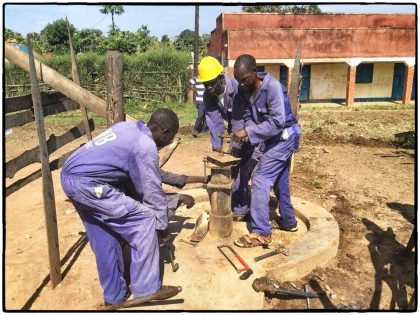 displaced, and about 2.5 million who have fled to neighboring countries. Fighting in the agricultural heart in the south of the country led to approximately 6 million people facing starvation with famine breaking out in some areas. The country’s economy has also been devastated with inflation more than 300% per annum.
displaced, and about 2.5 million who have fled to neighboring countries. Fighting in the agricultural heart in the south of the country led to approximately 6 million people facing starvation with famine breaking out in some areas. The country’s economy has also been devastated with inflation more than 300% per annum.
On September 12, 2018, a new peace agreement was signed by all parties to the conflict. During this past year, our local Water is Basic team witnessed peace at the grassroots level in Yei where our WIB headquarters is located. We are confident that this peace is real and lasting and we have a greater sense of urgency than ever knowing that water is the number one need as people return home.
Water changes everything. As the South Sudanese people can access clean water, they have witnessed a transformation of health. Death rates fall. Education rates rise. Access to food is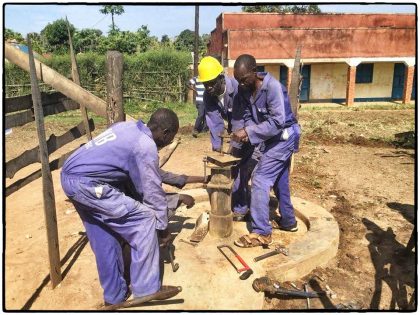
increased, and local economies grow. Ancient conflicts over water rights and access become
obsolete. Peace sweeps through areas where water shortages once caused civil war and conflict.
A Proven Method
Water is Basic along with other key partners in South Sudan has been instrumental in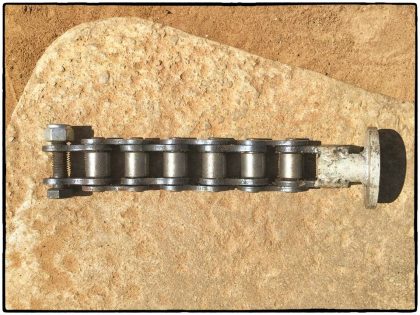
developing and implementing grassroots peace. Ensuring that water points are fully functional
and water committees are well managed is key to achieving peace.
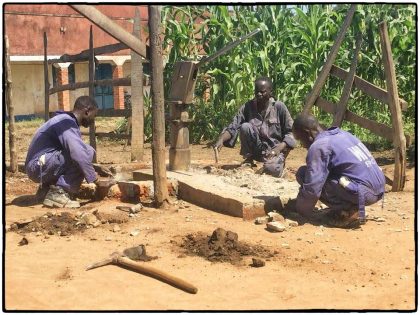
Since our first well was drilled on July 28, 2008, Water is Basic’s goal has been to work with the
leadership and communities of Yei River State to ensure communities have access to clean
water.
The primary objectives consist of the following:
1. Work with local leadership to assess daily locations where wells are in need of repair.
2. Provide the equipment for restoration projects and skilled local labor.
3. Restore wells until clean water is accessed.
4. Equip community members to establish committees comprised of 50% women to oversee
each well.
Our model implements sustainable, local solutions, and has proven effective. Since our first
borehole was dug in July 2008, we have installed over 500 wells and restored over 350 more,
providing clean water to over 1,250,000 people. Nonetheless, we always learn from each
project and integrate those lessons as we move forward.
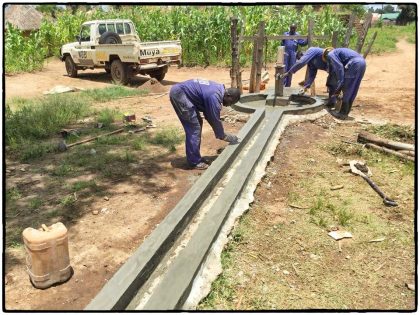
Access to clean water impacts all aspects of life; education, health, economic development,
community development, and general well-being through the reduction of the numerous
hardships created by lack of clean water. Additionally, empowering individuals—those facing
daily poverty in a country torn by war—to implement a community-devised solution to a local
crisis lifts the human spirit and provides opportunities to dream and reach their full potential.
Moreover, girls and women suffer uniquely from boys and men in this water crisis. Eliminating or
significantly reducing the time spent daily to fetch water allows girls and women to utilize this
time to go to school or seek economic opportunities, and will help to end the pain and health
problems associated with carrying 20-liter jerry cans on their heads daily for miles.
Immediate Objective
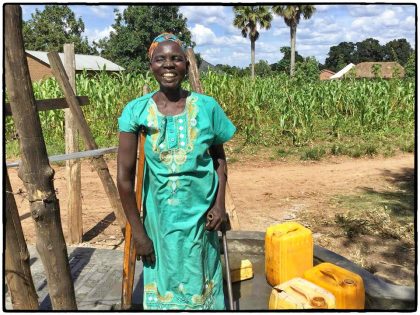 The local Water is Basic team is currently restoring wells from the Ugandan border to well within the country of South Sudan. More than 1,000,000 South Sudanese sought refuge in Uganda over the last 18 months part of the draw to return home, is clean water.
The local Water is Basic team is currently restoring wells from the Ugandan border to well within the country of South Sudan. More than 1,000,000 South Sudanese sought refuge in Uganda over the last 18 months part of the draw to return home, is clean water.
This year we have restored 90 wells and are planning to increase that number to 200 in 2019.
With peace, our team will be able to move about freely to reach more areas. Providing
increased access to clean water in South Sudan will allow refugees and those who are internally
displaced to return to their communities and rebuild their lives.
The overall expected benefits include:
1. Approximately 24,000 people currently without clean water will benefit from the 16 restored
wells requested.
2. Relief for returnees from refugee camps or IDP camps as they journey home to their
communities for resettlement.
3. Reduction in the number of people in Yei River State suffering from illnesses related to
drinking unsafe water.
4. Reduction in time spent on fetching water for girls and women.
5. Increased number of girls who are able to go to school, thus minimizing risks of poor
outcomes associated with lack of primary education (e.g., illiteracy, human tracking, and
contracting STDs).
6. Increased number of women who are able to work (outside of the home) and contribute to the
family’s financial stability.
7. Decreased health problems for girls and women related to carrying jerry cans for long
distances.
8. Elimination of conflict and violence from conflicts over water.
9. Creation of employment opportunities for the people of Yei River State as a result of restoring
the water wells.
10. Reduction of poverty and increased income for families as a result of not having to pay for
water for neighboring villages.
11. Improved agriculture and work opportunities for Yei River State.
12. Improved social-emotional well-being for Yei River State’s people due to the elimination of
water conflicts and from solving their community’s water problem through collaborative
grassroots peace efforts.
13. Providing more learning opportunities to be shared with other organizations that are working
on developing sustainable local solutions to local water problems.
Project Funding
The funds to implement this project have been advanced by an anonymous donor. Your contribution using the Donate button below will allow us to continue this important work in South Sudan.
Click the links below to read about the parts that have been completed to date:
Conclusion of South Sudan Well Rehab Phase 5 – Part-1
Conclusion of South Sudan Well Rehab Phase 5 – Part-2
Conclusion of South Sudan Well Rehab Phase 5 – Part-3
